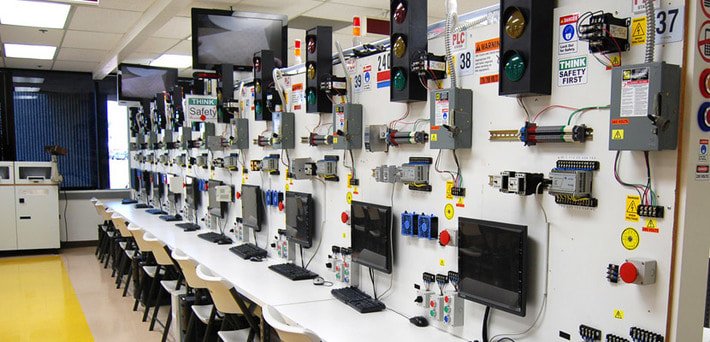In today’s competitive industrial landscape, Saudi factories and production plants are under constant pressure to improve efficiency, reduce operational costs, and meet strict quality standards. One of the most effective solutions to achieve these goals is the adoption of Programmable Logic Controllers (PLCs).
What is a PLC?
A Programmable Logic Controller (PLC) is a rugged digital computer specifically designed to control manufacturing processes such as assembly lines, robotic devices, or any activity that requires high reliability and real-time computing. Unlike traditional PCs, PLCs are built to operate in harsh industrial environments—heat, dust, moisture, and electrical noise.

Key Features of PLC Systems:
- High Reliability: Designed for continuous operation in industrial settings.
- Real-Time Performance: Instantly processes input and output signals.
- Scalability: Easily adapted for both small machinery and complex industrial lines.
- Easy Programming: Uses Ladder Logic or other languages for customization.
- Integration-Friendly: Seamlessly connects with HMIs, SCADA systems, and other automation tools.
Benefits of Using PLCs in Saudi Industries:
- Increased Production Efficiency:
PLCs help automate repetitive tasks and reduce human error, resulting in faster production cycles and higher output. - Reduced Operational Costs:
By optimizing energy use and minimizing downtime, PLC-controlled systems lead to significant cost savings in the long term. - Improved Product Quality:
Automated control ensures consistent quality, which is crucial for industries such as food processing, petrochemicals, and pharmaceuticals in Saudi Arabia. - Flexibility for Future Upgrades:
As your factory grows or technology evolves, PLC systems can be reprogrammed or expanded without costly equipment replacement.

Why Saudi Factories are Moving Towards PLC Systems:
With the Kingdom’s Vision 2030 driving industrial modernization, local manufacturers are investing in automation technologies to stay competitive. PLC systems are a key part of this transformation, enabling factories to:
- Meet international standards for production.
- Reduce reliance on manual labor.
- Ensure safety and operational excellence.
Applications of PLCs in Different Industries:
- Oil & Gas: For pipeline monitoring and drilling operations.
- Food & Beverage: Automating mixing, filling, and packaging processes.
- Pharmaceutical: Ensuring precise dosage and production consistency.
- Water Treatment Plants: Controlling pumps, valves, and filtration systems.
Conclusion:
Implementing PLC systems in your industrial facility is no longer an option—it’s a necessity to remain competitive in the Saudi market. Whether you run a small production unit or a large manufacturing plant, PLCs offer scalability, efficiency, and cost-effectiveness.

